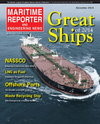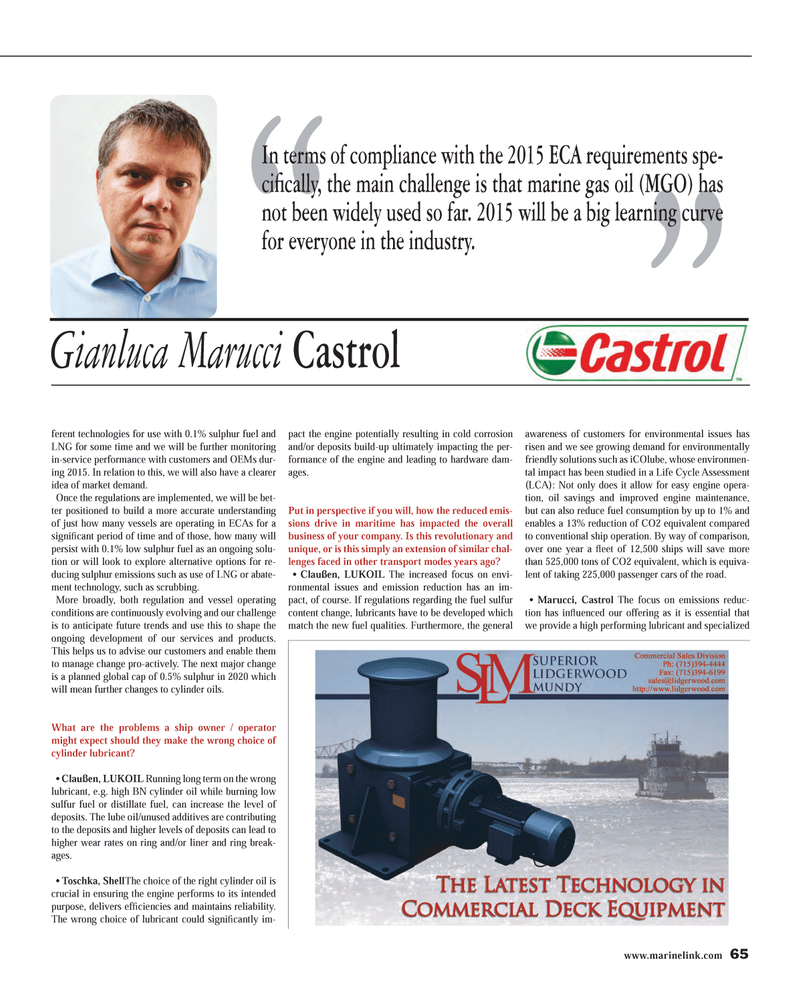
Page 65: of Maritime Reporter Magazine (December 2014)
Great Ships of 2014
Read this page in Pdf, Flash or Html5 edition of December 2014 Maritime Reporter Magazine
www.marinelink.com 65 ferent technologies for use with 0.1% sulphur fuel and
LNG for some time and we will be further monitoring in-service performance with customers and OEMs dur- ing 2015. In relation to this, we will also have a clearer idea of market demand.
Once the regulations are implemented, we will be bet- ter positioned to build a more accurate understanding of just how many vessels are operating in ECAs for a signifi cant period of time and of those, how many will persist with 0.1% low sulphur fuel as an ongoing solu- tion or will look to explore alternative options for re- ducing sulphur emissions such as use of LNG or abate- ment technology, such as scrubbing.
More broadly, both regulation and vessel operating conditions are continuously evolving and our challenge is to anticipate future trends and use this to shape the ongoing development of our services and products.
This helps us to advise our customers and enable them to manage change pro-actively. The next major change is a planned global cap of 0.5% sulphur in 2020 which will mean further changes to cylinder oils.
What are the problems a ship owner / operator might expect should they make the wrong choice of cylinder lubricant? • Claußen, LUKOIL Running long term on the wrong lubricant, e.g. high BN cylinder oil while burning low sulfur fuel or distillate fuel, can increase the level of deposits. The lube oil/unused additives are contributing to the deposits and higher levels of deposits can lead to higher wear rates on ring and/or liner and ring break- ages. • Toschka, Shell The choice of the right cylinder oil is crucial in ensuring the engine performs to its intended purpose, delivers effi ciencies and maintains reliability.
The wrong choice of lubricant could signifi cantly im- pact the engine potentially resulting in cold corrosion and/or deposits build-up ultimately impacting the per- formance of the engine and leading to hardware dam- ages.
Put in perspective if you will, how the reduced emis- sions drive in maritime has impacted the overall business of your company. Is this revolutionary and unique, or is this simply an extension of similar chal- lenges faced in other transport modes years ago? • Claußen, LUKOIL The increased focus on envi- ronmental issues and emission reduction has an im- pact, of course. If regulations regarding the fuel sulfur content change, lubricants have to be developed which match the new fuel qualities. Furthermore, the general awareness of customers for environmental issues has risen and we see growing demand for environmentally friendly solutions such as iCOlube, whose environmen- tal impact has been studied in a Life Cycle Assessment (LCA): Not only does it allow for easy engine opera- tion, oil savings and improved engine maintenance, but can also reduce fuel consumption by up to 1% and enables a 13% reduction of CO2 equivalent compared to conventional ship operation. By way of comparison, over one year a fl eet of 12,500 ships will save more than 525,000 tons of CO2 equivalent, which is equiva- lent of taking 225,000 passenger cars of the road. • Marucci, Castrol The focus on emissions reduc- tion has infl uenced our offering as it is essential that we provide a high performing lubricant and specialized ” “
Gianluca Marucci Castrol
In terms of compliance with the 2015 ECA requirements spe- cifi cally, the main challenge is that marine gas oil (MGO) has not been widely used so far. 2015 will be a big learning curve for everyone in the industry.
MR #12 (58-65).indd 65 12/2/2014 2:43:21 PM

 64
64

 66
66
